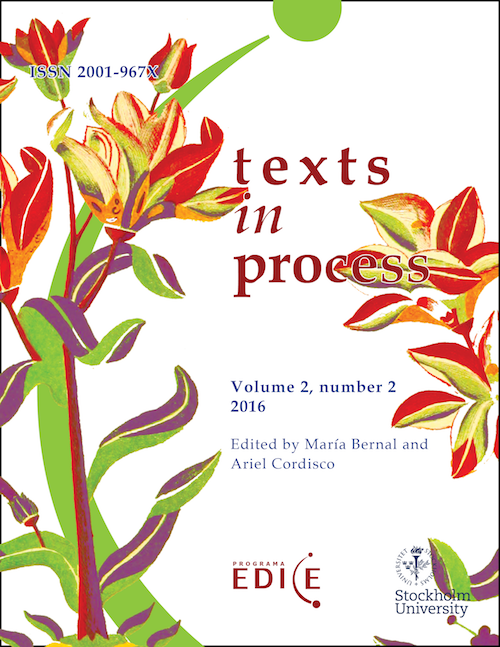From irony to sarcasm: an aproximation to Spanish parliamentary discourse
Abstract
In this paper we will study the irony gathered in the parliamentary speeches in Spanish language. From this research object, and following the Theory of Argumentation, it is based on the hypothesis that irony in its negative valuation becomes sarcasm (which will come to be understood here as the variant of irony). We will also understand that irony, as a dialectical weapon, is the shield that allows the politician to consolidate his adversary role thanks to the maximum dependence of the sociocultural context. For all this, we will present discursive samples, on the one hand, to defend that this pragmatic resource is a mechanism of cohesion in the discursive process of the ideological argumentation of the politician; on the other hand, to try to categorize the linguistic mechanisms for their expression.
Downloads
References
Alcaide Lara, E. R. (2004). “La ironía, recurso argumentativo en el discurso político”. RILCE, Revista del Instituto de Lengua y Cultura Españolas, 20 (2), pp. 169-189.
Alcaide Lara, E. R. (2011). “Cuando la oralidad “se despierta”: la ironía en el discurso político no parlamentario”. Sintaxis y análisis del discurso hablado: homenaje a Antonio Narbona, Sevilla: Editorial de la Universidad de Sevilla, pp. 35-50.
Alcaide Lara, E. R. (2014). “La relación argumentación-(des)cortesía en el discurso persuasivo”. Sociocultural Pragmatics, 2 (2), pp. 223-261.
Alvarado Ortega, B. (2009). Ironía y cortesía. En Ruiz Gurillo, L. y Padilla García, X. (Eds.), Dime cómo ironizas y te diré quién eres: una aproximación pragmática a la ironia. Frankfurt: Peter Lang, pp. 333-345)
Berrendonner, A. (1987). Elementos de Pragmática Lingüística. Trad. Mizraji, M. Barcelona: Gedisa, 1987.
Bruzos Moro, A. (2005). “Análisis de la enunciación irónica: del tropo a la polifonía”. Pragmalingüística, 13, pp. 25-49.
Cabedo Nebot, A. (2009). “Análisis y revisión del sarcasmo y la lítote”. Boletín de Filología, 2, XLIV, pp. 11-38.
Charaudeau, P. (2009); “La argumentación persuasiva. El ejemplo del discurso político”, en Shiro M. & alii, Haciendo discurso. Homenaje a Adriana Bolívar, Facultad de Humanidades y Educación, Universidad Central de Venezuela, Caracas, 2009, pp. 277-295.
Coupland, N. (2004). “Stylised deception” en Jaraworki, A. y Coupland, N. (Eds.), Metalanguage: Social and Ideological Perspectives. Berlín: Mouton de Gruyter, pp. 249-273.
Ducrot, O. (1984). El decir y lo dicho: polifonía de la enunciación. Barcelona: Paidós.
González Sanz, M. (2016): “Empleo de la ironía en la tertulia política. Análisis cualitativo-cuantitativo”. Tonos Digital, 30, pp. 1-33.
Goubet Torrealba, C.A. (2008). “La ironía como recurso argumentativo-persuasivo en el discurso político de la prensa escrita”. Cyber Humanitatis, Revista de la Facultad de Filosofía y Humanidades, Universidad de Chile, 45, pp. 1-8.
Grice, P. (1981): “Presupposition and conversational implicature”. En Cole, P. (Ed.), Radical Pragmatics, Nueva York: Academic Press.
Gutiérrez, S. (2006). “Discurso político y argumentación”. Recuperado de http://web.uchile.cl/facultades/filosofia/Editorial/libros/discurso_cambio/72Gutie.pdf
Laborda Gil, X. (2002). “Ironía, sarcasmo y cortesía en el agradecimiento político”. Oralia, 5, pp. 313-322.
Pano Alamán, A. (2015). “Ironía verbal y actividad de imagen en el discurso de políticos y ciudadanos españoles en Twiter”. Sociocultural Pragmatics, 3 (1), pp- 59-89.
Piatti, G. I. (2009). “La ironía: Una estrategia evaluativa encubierta”. Puertas abiertas, Universidad Nacional de la Plata, Facultad de Humanidades y Ciencias de la Educación, 5, pp. 1-9.
Pujante, D. (2010): “El discurso político como discurso retórico. Estado de la cuestión”. Recuperado de http://www.cervantesvirtual.com/obra/el-discurso-politico-como-discurso-retorico-estado-de-la-cuestion/
RAE. Diccionario de la lengua Española. Recuperado de la Versión electrónica http:// www.rae.es
Sperber, D. y Wilson, D. (1994). La relevancia. Comunicación y procesos cognitivos. Madrid: Visor.
Weber, M. (1978). Economy & Society: An outline of interpretative sociology. Berkeley: University of California.

Copyright (c) 2016 Eva Martínez Díaz

This work is licensed under a Creative Commons Attribution 4.0 International License.
Texts in Process (TEP) is a non-commercial open-access scholarly journal governed by a Creative Commons Recognition 4.0 International license. It follows a full and unrestricted open access, without charges or fees for shipping, reviewing, processing and publishing articles. Users can read, download without registering, distribute, print or link the complete texts of numbers and articles, without the permission of the editors or authors. There is also no charge to publish (APCs), being applicable to the entire editorial process. The authors retain their intellectual rights at all times.
ASICE-EDICE Programme has always believed that non-commercial, open, unlimited and unrestricted access to specialized academic publications is a vehicle for academic freedom and scientific rigor. It adheres and shares the Declaration of Mexico and DORA to guarantee the protection of academic and scientific production in Open Access.
















